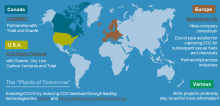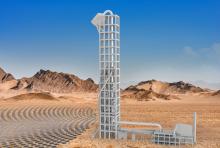
The three companies have been working on the project since the end of 2020 to assess its technical feasibility and benefits for the local community. The plant is expected to come online in early 2023.
The partners say the project's aim is to capture CO2 from the emissions generated during the cement manufacturing process, treat the captured carbon dioxide and enable its subsequent agricultural use.
The captured carbon will be used in greenhouses in the region, where it will improve crop productivity through a process known as carbonic fertilization, which mimics and enhances natural photosynthesis, increasing the eco-efficiency of crops by reducing the proportion of water and soil per kg of vegetable production. This circular carbon economy project will reduce CO2 emissions and offer a sustainable future.
Isidoro Miranda, CEO of LafargeHolcim Spain, commented: “Thanks to the creation of this joint-venture we are getting closer and closer to completing this project that will contribute to improving the competitiveness and efficiency of our factory, but also of local agricultural production compared to the high-tech greenhouses that already use this technique in other European countries."
He added: “This circular economy business model, which will initially start with the capture of 10% of carbon dioxide emissions, will become an important milestone in our roadmap towards decarbonisation of the construction materials sector."
Aniruddha Sharma, CEO of Carbon Clean, said: “We are delighted to announce this joint-venture, a milestone that consolidates the strategic relationship with LafargeHolcim Spain. We are confident that, coupled with LafargeHolcim's extensive expertise in cement manufacturing, Sistemas de Calor's expertise and our technology, this ambitious project will accelerate the development of the circular carbon economy in the cement industry in Europe."
Antonio Cambil, CEO of Sistemas de Calor, stated: “Having quality CO2 available at reasonable prices will be an important incentive for farmers to move towards high-tech greenhouses. This will result in higher productivity and an improvement in the international competitiveness of agriculture in Almería ”.









